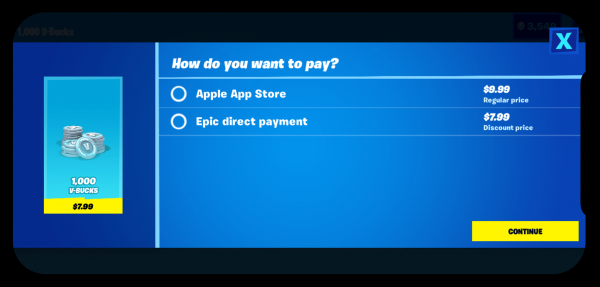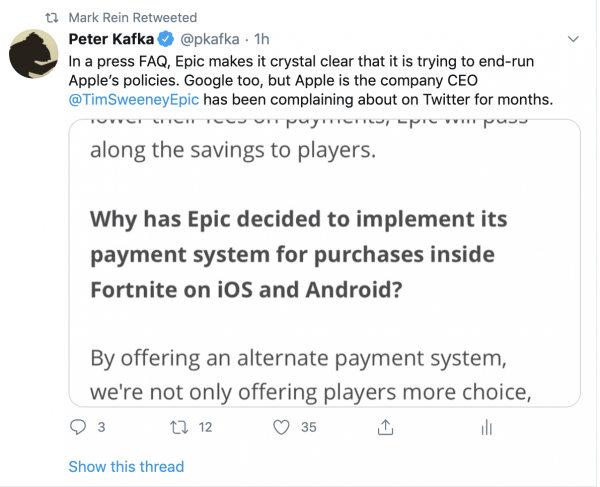
This story is part of a group of stories called

Uncovering and explaining how our digital world is changing — and changing us.
The company that owns Fortnite is making an in-your-face challenge to Apple: We’re not going to obey the rules you’ve set for your powerful App Store. And we dare you to do something about it.
Now Apple has done something: After Epic Games announced this morning that it was encouraging Fortnite players to bypass Apple’s in-house payment system — an intentional violation of Apple’s app policies — Apple has removed Fortnite from its App Store, claiming that Epic wanted “a special arrangement” that other developers don’t get.
What that means: If you’ve already downloaded Fornite to your iPhone or iPad, you can still use it. But the move does mean that Epic won’t be able to update the app — something that it did regularly to fix bugs and introduce new features. So if the situation doesn’t change, Epic will eventually have to abandon Fortnite’s Apple users.
And now Epic, in response to Apple’s response, says it is filing an antitrust lawsuit against Apple in US District Court. It is also telling its Apple users they won’t be able to play future versions of its game: “Because Apple has BLOCKED your ability to update, when Fortnite Chapter 2 – Season 4 releases you will NOT be able to play the new Season on iOS.”
It’s a fascinating standoff between a very profitable, highly valued gaming company and one of the most powerful companies in the world. The way it plays out could have consequences for Apple, its tech rivals — and antitrust regulators.
Epic, the North Carolina-based developer behind Fortnite and other games, announced on Thursday morning that players who want to buy Fortnite’s virtual currency would no longer have to buy it via Apple’s App Store. Instead, it told them they could buy it directly from Epic. The difference for players, however, is that Epic would charge them 20 percent less if they buy the currency from Epic instead of Apple.
It’s a small change that’s a big deal because Apple has explicitly prohibited developers from promoting these kinds of end runs around its powerful App Store. Instead, Apple wants developers to sell their digital goods within its marketplace, where it takes a cut of up to 30 percent for each purchase.
That stance has long upset developers, who argue that Apple’s fee is too onerous and gives its home-grown products a leg up on competitors by essentially letting Apple sell its own stuff with a much better profit margin. Apple sells its music service, for instance, for $10 a month; if a rival music service sold subscriptions via Apple’s store for the same price, it would have to fork over as much as $3 of that to Apple.
So, over time, some big players, including Netflix and Spotify, have stopped selling subscriptions to their services from the Apple App Store altogether. You can use Spotify and Netflix on Apple devices, but if you want to pay for them, you have to visit those companies’ websites. Spotify has also filed a complaint with European antitrust regulators, who are now investigating Apple’s policies.
Apple has also drawn attention from US lawmakers like Sen. Elizabeth Warren, who has said the company is trying to “lock out” competitors. Last month, Apple’s policies came under fire when CEO Tim Cook testified at a congressional antitrust hearing.
And in the past few weeks, Apple’s App Store policies have also generated conflict with both Facebook and Microsoft, which complained that Apple was barring gaming services they wanted to distribute through the App Store.
But no developer has done what Epic did on Thursday, broadcasting that it wasn’t going to play by Apple’s rules. For the time being, if you try to buy 1,000 “V Bucks” in Fornite, Epic will ask you whether you want to spend $10 to do so via Apple’s store or $8 to do it from Epic:

Epic explained the move to its users by describing it as new “discount pricing.” But in a post aimed at the media, the company went out of its way to point out that it was defying Apple’s 30 percent tax, as well as a similar one that Google’s app store also charges.
“Apple and Google collect an exorbitant 30% fee on all payments” for virtual goods, the post said, pointing out that Apple doesn’t collect a similar fee for real-world goods developers like Amazon, McDonald’s, and Uber sell via Apple apps. “Epic direct payment simply offers players the same kinds of payment options as these other apps.”
While Epic’s move affects both Apple’s and Google’s app stores, Apple is the company that clearly rankles Epic CEO Tim Sweeney, who has been complaining about the company on Twitter for weeks:
So now Sweeney is making a very big gamble. He’s daring Apple to either back down from its stance or shutter Fornite’s Apple app and see what millions of Fortnite players do next. In the worst case, the company seems to be thinking, it can survive with a player base that comes from other platforms, like gaming consoles and PCs.
For now, Apple is taking Epic head on — which is likely the only move it could make, in the short term: If it allowed Epic to run an alternate payments system while preventing other developers from doing so, it would have an even bigger headache. But longer term, this may increase pressure on Apple to change its policies.
Here’s a statement from Apple PR, released after the company removed Fortnite from the App Store:
While Epic doesn’t have the same kind of awareness of big tech players like Facebook and Amazon, the company certainly has the capacity to fight Apple. Epic says it generated earnings of $730 million last year on revenue of $4.7 billion; much of that money came from Fornite, which Epic says has 350 million players worldwide.
But while Epic has substantial resources, losing access to Apple customers could still cost it real money. SensorTower estimates that Apple customers spent $1.2 billion on Fortnite since March 2018. That would mean after Apple took 30 percent of that haul, Epic would be left with $840 million. Those numbers have presumably been trending down as Fortnite’s red-hot popularity cooled, but Epic would certainly like to have those customers again.
I’ve asked Epic for comment and will update if it provides any. In the meantime, it may be worth noting that Epic co-founder Mark Rein retweeted my analysis of this morning’s move, without comment:

The timing for Sweeney’s move is interesting. It comes after Epic raised a staggering $1.8 billion, which values Sweeney’s company at more than $17 billion. But it also comes after Cook’s appearance in front of Congress. Had Epic done this in the runup to that event, the situation certainly would have been raised by lawmakers.
The move also happens on the same day that Apple’s plans to sell even more of its own digital services have come into focus. Bloomberg reports that Apple plans to sell bundles of Apple subscriptions to products like its music, video, and gaming services — later this fall, at a discount.
Will you become our 20,000th supporter? When the economy took a downturn in the spring and we started asking readers for financial contributions, we weren’t sure how it would go. Today, we’re humbled to say that nearly 20,000 people have chipped in. The reason is both lovely and surprising: Readers told us that they contribute both because they value explanation and because they value that other people can access it, too. We have always believed that explanatory journalism is vital for a functioning democracy. That’s never been more important than today, during a public health crisis, racial justice protests, a recession, and a presidential election. But our distinctive explanatory journalism is expensive, and advertising alone won’t let us keep creating it at the quality and volume this moment requires. Your financial contribution will not constitute a donation, but it will help keep Vox free for all. Contribute today from as little as $3.
Sourse: vox.com





